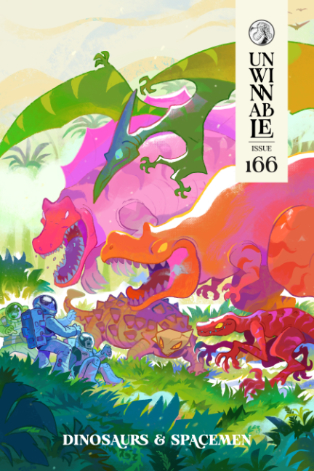
An Adult Critique of Books for Children

This column is a reprint from Unwinnable Monthly #166. If you like what you see, grab the magazine for less than ten dollars, or subscribe and get all future magazines for half price.
———
Now this.
———
At my core, I’m fundamentally a hater. When this column was exclusively about hip hop, I tried to avoid negative reviews though. These artists were just releasing their music, and I didn’t feel right throwing out a hit piece at some random rapper just because I didn’t like what they put out. But now that this column has a bit of a larger remit, let the hating commence. And you know what doesn’t get enough hate in my opinion: children’s books.
With a two-year-old at home, I spend so much of my time reading, rereading, and re-rereading various board books and interactive flap books that I’ve started to have some opinions on them. Yes, some of them are classics for a reason, but some of these other books need to be taken down a peg, and I’m starting with one of the classic authors of the genre, Sandra Boynton.

Your Nose! – Sandra Boynton
Anybody with a kid will tell you that Sandra Boynton is a fixture in the children’s book scene with over 75 books to her name (not to mention greeting cards and albums). For the most part, I really enjoy Boynton’s work: Moo, Baa, La La La and The Going to Bed Book are already classics for my kid at this point, and books like The Barnyard Dance and Let’s Dance Little Pookie are awesome as he starts to figure out what things like stomp, spin and strut mean.
But, with Your Nose! Boynton really dropped the ball. Ostensibly, Your Nose! is a nice song book about a mom and how much she loves her kid’s nose. Cute, right! Except it’s absolutely impossible to sing. There seems to be no rhythm in the words, no flow at all. I can kind of make the first couple pages work to the “Lightworks” beat by J Dilla, but that even falls apart by page three. My wife thinks it sounds more like Kim Zolciak’s “The Ring Didn’t Mean a Thing” (content warning: do not click that link if you have any appreciation for the art of tune or melody). After innumerable rereads of Your Nose!, I’m still absolutely flabbergasted about how this is supposed to sound, and that sucks because the little man has become obsessed with this book. Again, we still love most of Boynton’s stuff over here, but if you have any desire to sing a song with any sort of pattern, maybe leave this one on the shelf.

Grandma and the Pirates – Phoebe Gillman
I’m not sure if Grandma and the Pirates is a classic of the children’s genre, but it is definitely an odd entry. Essentially, a grandma, granddaughter and their parrot get human trafficked by pirates. The newly enslaved toil under the watchful eyes of the pirates as they pillage the high seas, until they trick the villains into leaving them alone on the boat, which they proceed to steal sail off into sunset. Honestly, I could have seen this being made into a movie in the heat of the 2000s after the success of Pirates of the Caribbean. However, I also understand why no one picked it up. Here’s a quick list of my thoughts about what makes this book less than a classic:
- Pirates, like 18th-century, fluffy shirt-wearing, flintlock pistol-toting buccaneers, kidnap a young girl named … Melissa? That name feels a bit too 20th-century to feel at home in this book.
- Grandma accidentally attracts the pirates to her house by cooking a noodle pudding and the “delicious noodly aroma” wafts out to see and draw them in. I, for one, have never associated the noodles with their smell, especially not a delicious smell.
- After the pirates finish the noodles, they stuff the rest of Grandma’s cabinet into their sack, and the writing turns into a quick little poem about all the food they steal. It feels strange to just bust into rhyme in the middle of a book which, other than one page, has absolutely no rhyme scheme.
- The human trafficking victims trick the pirates into going onto the island of Boola Boola (love that name, though), and they end up sailing the ship away. The final page is the pirates exclaiming, “Egads! Where’s my ship?” Shouldn’t there be some sort of denouement though? Shouldn’t we see Melissa and her grandma happily back at home with hordes of treasure or something? It’s just an odd ending.
In the grand scheme of things, I don’t hate Grandma and the Pirates, but I do find it a strange little book. A few highlights, but overall, it doesn’t quite work.

Where’s Spot? – Eric Hill
The Spot books are seemingly ubiquitous in the children’s books section, and in the grand scheme of things, I do get the appeal. Of the books I’ve read, including Where’s Spot?, the basic plot is the same: Spot goes missing somewhere (a house, a museum, a zoo) and the kids go through the book and open up little flaps in search of him, revealing various other animals that are not Spot, until the end, when they find him. Fundamentally harmless and fun for the kids, but formally I hate it. The writing is stiff and bland and the characters are weak and undefined.
Now you might ask yourself, “Noah, kids books aren’t supposed to be high literature with great writing. How are you going to sit here and call out bad writing in a book meant for kids to read?” To you I say, why do we have to read this Spot drivel when well-written books for kids actually exist. Why am I reading and rereading this stiff, incredibly inane dialogue when books like the following exist in the exact same area and are, on all accounts, well written.

We Found a Hat, I Want My Hat Back, and This is Not My Hat – Jon Klassen
These books were some of the first we received when my son was born, and I couldn’t be happier with them. The sweetest of the three, We Found a Hat, centers on a pair of turtles who find a hat and can’t decide who should wear it. They try to forget about it, but one turtle can’t. As our less magnanimous tortoise is about to take the hat while the other is sleeping, he decides it’s better in dream land, where both of them get to wear hats and they both look very good.
I Want My Hat Back and This Is Not My Hat are both decidedly darker stories. In I Want My Hat Back, our bear protagonist has lost his red, pointy hat and asks a variety of animals if they have seen it. When all hope is lost, he realizes the rabbit he saw earlier was wearing it, and he proceeds to eat the rabbit and take his hat back. This is Not My Hat is almost the exact same story, inverted. A small fish steals a hat from a large fish and goes to hide in the bushes. He’s sure the big fish will not find him, but a snitching-ass crab points the way. I’m a little haunted by the final words from the small fish as he goes into his hiding space among the plants that grow big and tall: “Nobody will ever find me.” A page later, we see the large fish leaving the same place, wearing his hat. We never see the small fish again.
Overall, I think the morals of these books are nice (don’t steal or you’ll get eaten and share with your friends) and the illustrations are cute, but in the grand scheme of things, I think it’s the writing that really sticks out. Klassen’s prose is clear and direct, but also interesting. The dialogue feels precise and rhythmic – the books have a certain pace about them that makes rereading them a pleasure, not a chore.

The Gruffalo and Room on the Broom – Julia Donaldson and Axel Scheffler
Finally, I want to spend a little time writing about what may be my two favorite children’s books this side of my own childhood. The Gruffalo follows a small mouse on his walk through the woods where he is harangued by predators, inviting him over for various types of meals. He brushes them off with stories of a terrible, made-up creature, the Gruffalo whose favorite food always seems to include the mouse’s antagonist. Having successfully scared off a snake, the mouse actually runs into the monstrous Gruffalo, who is very interested in eating a little mouse. Instead, the mouse leads him back through the woods, scaring off the very same creatures who were interested in him earlier, and finally revealing his own favorite food, Gruffalo crumble. The Gruffalo runs away in fear and the mouse munches on a nice little nut.

In Room on the Broom, by the same author-illustrator team, a witch flies around on a broom, picking up various animals, until they weigh too much and the broom snaps in two. As the witch flies wildly away, a dragon tries to eat her. But, once on the ground, the dog, cat, frog and bird arise out from a bog as a new kind of monster and scare the dragon away. The witch brews up a new broom and they fly merrily away.
So, why are these my favorite books? The illustrations are cute and all, and I really love the character design of the Gruffalo. However, I really like them because of the verses. Donaldson writes with a fantastic flow and rhythm. These are the opposite of Your Nose! Maybe it’s my own love of rap that draws me to these two books the most, but I just think they feel like the best written. Certain turns of phrases (“Oh, sure said the Gruffalo, bursting with laughter’ or “they dripped and they squelched as they strode from the ditch”) just catch my ear, and the verse structure makes memorization easy and enjoyable. The narratives themselves are fun too!
* * *
I’ve spent a lot of time with these books over the last couple years, and it feels good to get some of these thoughts out in print. It also feels really good to let some of this hate out, for the first three books at least. Now, would my kid agree with me on these ratings? Doubtful. He seems bored with the Gruffalo and the witch. He seems to be moving onto a grumpy monkey, but I really think he just wants me to sing about his nose again.
———
Noah Springer is a writer and editor based in St. Louis. You can follow him on Twitter @noahjspringer.




